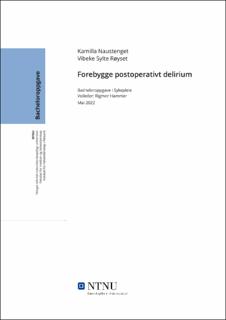Forebygge postoperativt delirium
Bachelor thesis
Permanent lenke
https://hdl.handle.net/11250/3005274Utgivelsesdato
2022Metadata
Vis full innførselSamlinger
Sammendrag
Bakgrunn: Av pasienter som gjennomgår ett kirurgisk inngrep er det mellom 11-42% som utvikler postoperativt delirium. Postoperativt delirium er assosiert med en økt mortalitet på 25-33%. Postoperativt delirium kan ha store konsekvenser for eldre pasienter og kan føre til forlenget sykehusopphold og store kostnader for helsesektoren.
Hensikt: Hensikten med denne studien er å belyse hvordan sykepleier kan forebygge postoperativt delirium hos eldre pasienter (65 år) på en kirurgisk sengepost.
Metode: Litteraturstudie med systematisk søk i databasene CINAHL og MEDLINE. Totalt 8 forskningsartikler er inkludert i oppgaven, både kvantitative og kvalitative.
Resultat: Analysen av forskningsartiklene førte frem til tre hovedtema for forebygging av postoperativt delirium: forebyggende sykepleietiltak, bruk av kartleggingsverktøy og sykepleiers kompetanse.
Konklusjon: Gjennom en helhetlig tilnærming kan sykepleierne bidra til å forebygge postoperativt delirium hos eldre pasienter på en kirurgisk sengepost. Sykepleietiltak som grunnleggende sykepleie, identifisering av risikopasienter ved bruk av kartleggingsverktøy og innføring av rutiner og prosedyrer er sentrale elementer ved den enkelte sykepleiers funksjon. Tilrettelegging av omgivelser, opplæring og undervisning er viktig som systemtiltak. Background: It’s between 11-42% of geriatric patients who receive surgery that develop postoperative delirium. The mortality associated with postoperative delirium is 25-33%. Postoperative delirium can lead to a series of unwanted consequences in geriatric patients and is associated with increased length of stay in hospital and major expenses in the health sector.
Aim: The aim of this study is to bring attention to how nurses can prevent postoperative delirium in geriatric patients > 65 years in surgical wards.
Method: Literature study with systematic searches in the databases CINAHL and MEDLINE. Total of 8 research articles are included in this study, which is both qualitative and quantitative.
Result: The analysis of the articles found three major themes: preventing nursing initiative, the use of screening tools and nurses’ competence.
Conclusion: Through a holistic approach nurses can prevent postoperative delirium in geriatric patients at surgical wards. Preventing nursing initiative such as fundamental nursing, identifying risk factors with the use of screening tools and implementing routines and procedures are key components in individual nursing. Adjustments in hospital environment, training and educations of nurses are important systemic measures.
